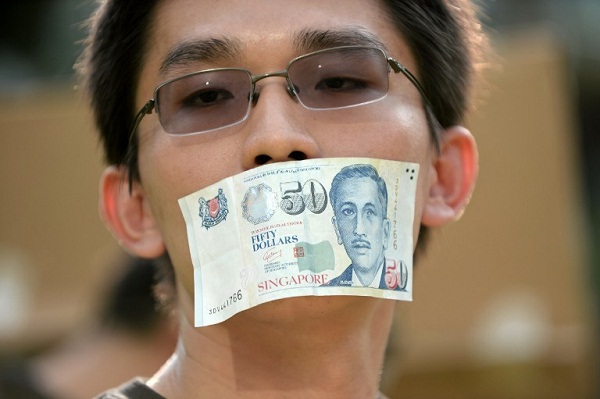
A protestor covers his mouth with a Singapore fifty-dollar note during a rally at a free-speech park on June 8, 2013, to protest new government licensing rules for news websites that they say curtail freedom of expression. The United States said Monday, July 8, 2013, it was “deeply concerned” by what it called a “new restrictive” law. AFP PHOTO / ROSLAN RAHMAN
WASHINGTON—The United States said Monday it was “deeply concerned” by what it called a “new restrictive” law in Singapore for licensing online news websites.
“We urge Singapore to ensure that freedom of expression is protected in accordance with its international obligations and commitments,” State Department spokesperson Jen Psaki said.
“We are concerned… to see Singapore applying press restrictions to the online world.”
The surprise regulations came into force on June 1 requiring news websites—including one operated by US-based Yahoo!—to obtain licenses from the city-state’s official media regulator.
Last month, Singaporean bloggers blacked out their homepages for 24 hours to protest the measure, which they say will muzzle freedom of expression.
The new rules stipulate that websites with at least 50,000 unique visitors from Singapore every month and publish at least one local news article per week over a period of two months must obtain an annual license.
Singapore’s media regulator, the Media Development Authority (MDA), and government leaders had sought to allay fears the rules were aimed at the feisty blogging community, pointing out that blogs were not considered news portals.
But websites granted a license will have to remove “prohibited content” such as articles that undermine “racial or religious harmony” within 24 hours of being notified by the authority.
The move has caused an uproar in the online community, which largely sees it as a measure to muzzle freedom of speech.
Bloggers participating in the Internet blackout insisted the law’s broad reach was indicative of the government’s intentions to require blogs to seek licensing in the future as well.